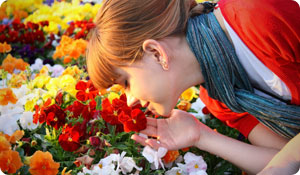
A bouquet of flowers may put your allergies in full bloom, but you don't have to forego a pretty vase of buds on your table or steer clear of a garden all summer long. There are a host of flower types you can enjoy without an unpleasant allergic reaction.
Many people assume that flowers that are the biggest and most vibrant are the ones that make them sneeze, cough, and itch. However, allergists point out that it's the more non-descript plants, those with very bland-looking flower buds that pose the highest risk. This is because the brighter plants often have pollen too heavy to be transported by the wind, making them a less likely allergy trigger. Plants with smaller, less noticeable flowers often have lighter pollen that's more easily lifted, making it easy for you to breathe it in.
Possible Causes of Flower Allergies
In order to avoid flower allergies, you need to carefully weed through the choices. Some plants, trees, and other greenery on your "danger" list can include:
- Ash
- Pine
- Maple
- Cedar
- Oak
Even a few flower types bearing heavier pollen in extra large quantities can also spark a reaction, such as Willow and Russian Olive.
Safer Picks
The good news is that there are many plants and flowers that either produce less pollen, or have pollen that's less likely to be airborne. Better yet, many of these "safer" flowers are also the most beautiful ones, so you can fully enjoy them without experiencing symptoms.
Some of the "good" picks for flower-allergy sufferers include:
- Rose
- Magnolia
- Dahlia
- Tulip
- Iris
- Snapdragon
- Hibiscus
- Geranium
- Daisy
Weeding Out Flower-Allergy Symptoms
If you're a gardening enthusiast who's prone to flower allergies, here's how to minimize the discomfort:
- Opt for "safer" types of flowers (see list above).
- When outdoors, wear a mask to minimize exposure to pollen.
- Plan your time outside when it's cloudy and calm out, or even lightly raining.
- After spending time outdoors, shower and wash your clothes to remove pollen.
Getting a Handle on Your Flower Allergy
You can also see an allergist and undergo skin testing to learn which types of plants and flowers pose a risk for you specifically, and to determine how best to prevent and treat your symptoms.
Sources:
"Don't Let Allergies Crash Your Party." American Academy of Allergy Asthma & Immunology. AAAAI, Spring 2010. Web. 30 March 2011.
"Gardening with Allergies." American Academy of Allergy, Asthma and Immunology. AAAAI, Spring 2006. Web. 30 March 2011.
"Topic of the Month - April- Select your seed to avoid the sneeze." American Academy of Allergy Asthma & Immunology. AAAAI, 1 April 2008. Web. 30 March 2011.





